5 Best Chinese Stocks to Buy in July 2021
Please note that we are not authorised to provide any investment advice. The content on this page is for information purposes only.
China is the world’s largest economy and Chinese stock could be a good way to diversify your portfolio. What are the five best Chinese stocks that you can buy in 2021?
Chinese stocks especially the tech companies have been under a pressure amid the crackdown by the government. The country is concerned about the alleged monopolistic behavior of tech giants and is also worried about the massive citizen data that these companies have. China’s crackdown has led to a sharp fall in some of the Chinese stocks but some of them could be good buys now.
1. Alibaba (NYSE: BABA)
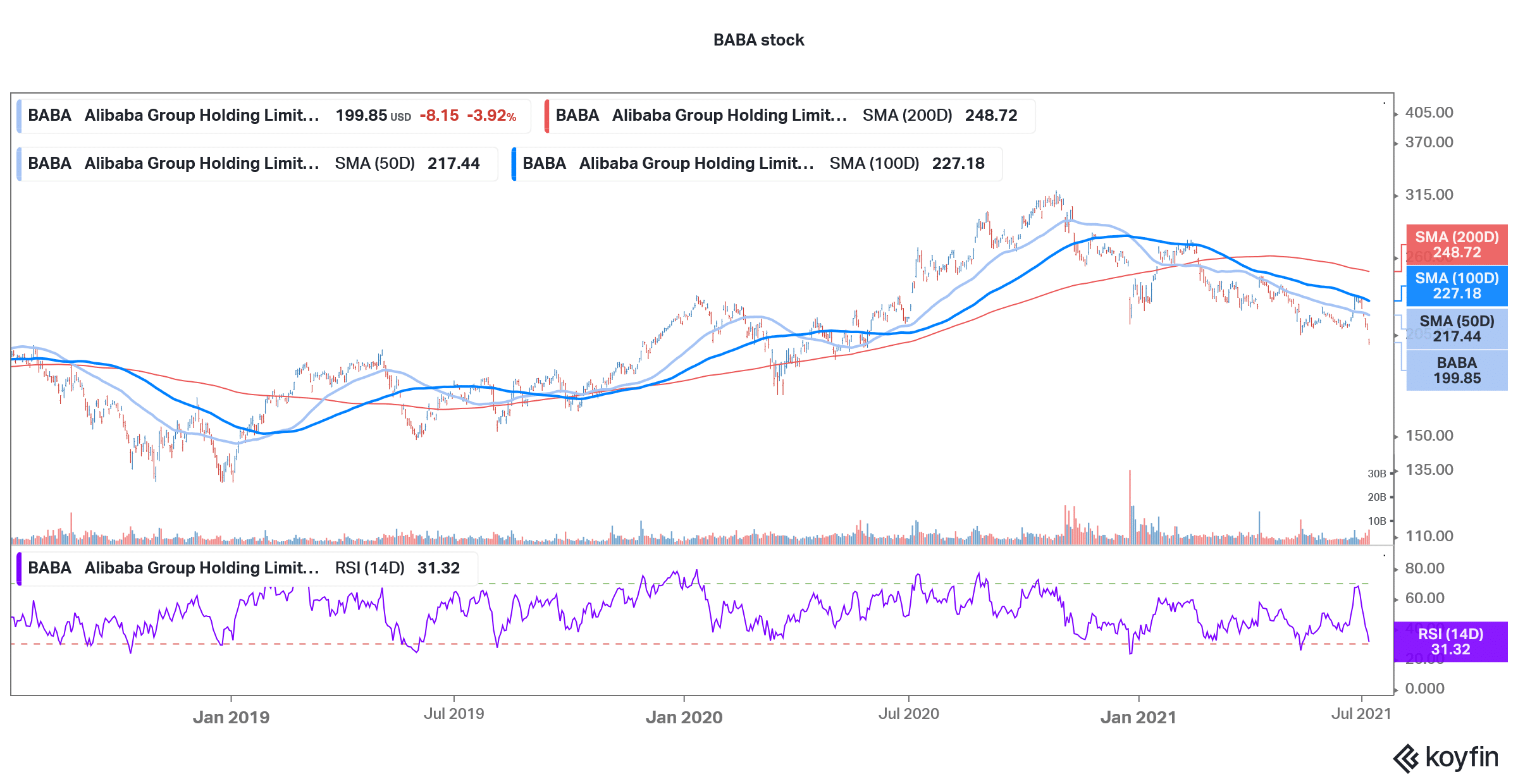
Alibaba is the largest Chinese tech stock listed on the US markets. The company went public in a US listing in 2014 and still holds the record for the biggest IPO ever. Alibaba stock has been under a scanner amid China’s crackdown on its tech stocks. However, the recent underperformance could be an opportunity to buy this quality Chinese stock.
Looking at the technicals, BABA stock looks in a clear downtrend. It has fallen below the 50-day, 100-day, and 200-day SMA (simple moving average). The stock failed to cross above the 100-day SMA which was a strong resistance and then also plunged below the 50-day SMA. However, the stock could be getting oversold now and has a 14-day RSI (relative strength index) of 31.3. RSI values below 30 indicate oversold positions while values above 70 signal overbought positions.
67% of all retail investor accounts lose money when trading CFDs with this provider.
Alibaba looks like the best Chinese stock to buy now
That said, from a fundamental perspective, if you are willing to get a little greedy when the markets are fearful, BABA looks like the best Chinese stock to buy now. Alibaba stock trades at an NTM (next-12 months) PE multiple of 19.9x which is very near its all-time low of 19x. Here it is worth noting that the company’s earnings in the current fiscal year would be impacted by the $2.8 billion fine that it agreed to pay to the Chinese government. Looking at the next fiscal year’s numbers, BABA looks even attractively valued.
If you are looking at exposure to the growing Chinese e-commerce market, BABA will fit the bill. The company also has cloud operations which are now positive on the EBITDA level. Overall, despite the headwinds of China’s tech crackdown, BABA looks like a good Chinese stock to buy at these levels.
67% of all retail investor accounts lose money when trading CFDs with this provider.
2. Didi Global (NYSE: DIDI)
China banned the downloads of the Didi app in China just days after the IPO. The stock has tumbled sharply after the crackdown. However, if you are willing to take a long-term view and are comfortable with short-term volatility, Didi stock offers a good entry point and looks like a good Chinese stock to buy now.
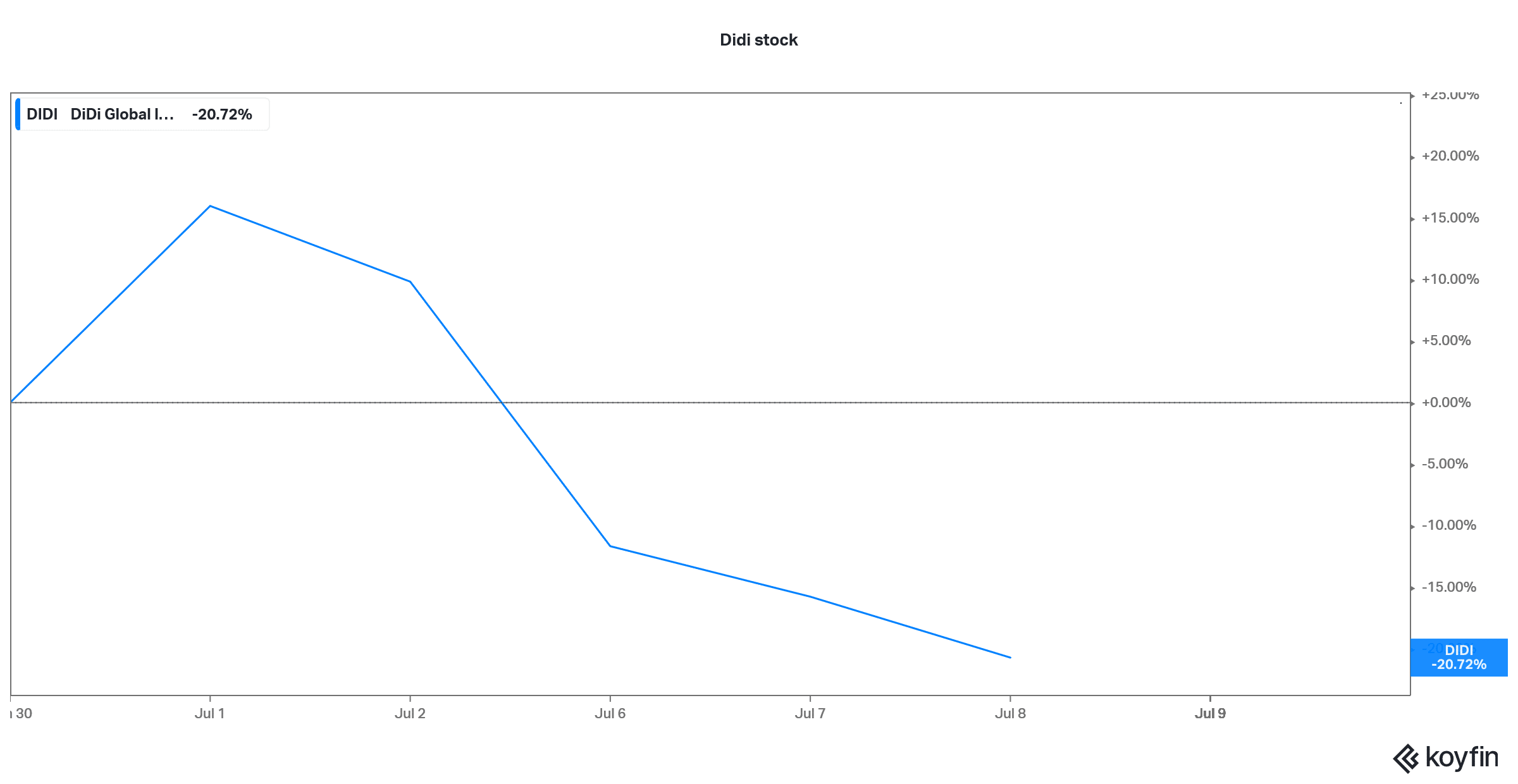
The company has a market capitalization of only about $55 billion while it posted revenues of $21.6 billion last year despite the COVID-19 pandemic. The stock trades at a trailing price to sales multiple of just over 2x which looks very attractive considering the high valuations of other ride-hailing companies like Uber, Lyft, and Grab which is going public through a SPAC (special purpose acquisition company) merger. The company’s market capitalization is even below the $62 billion that it commanded in the most recent private value transaction.
While the company’s outlook has arguably been hampered by China’s crackdown, it looks like a good Chinese stock to buy now. While it is risky, the returns can also be commensurate.
67% of all retail investor accounts lose money when trading CFDs with this provider.
3. Xpeng (NYSE: XPEV)
Chinese electric vehicle companies have delivered good returns. There are several Chinese electric vehicle stocks listed on the US markets but XPEV looks like a good buy. The company recently went for a dual primary listing in Hong Kong amid the growing US-China tensions.
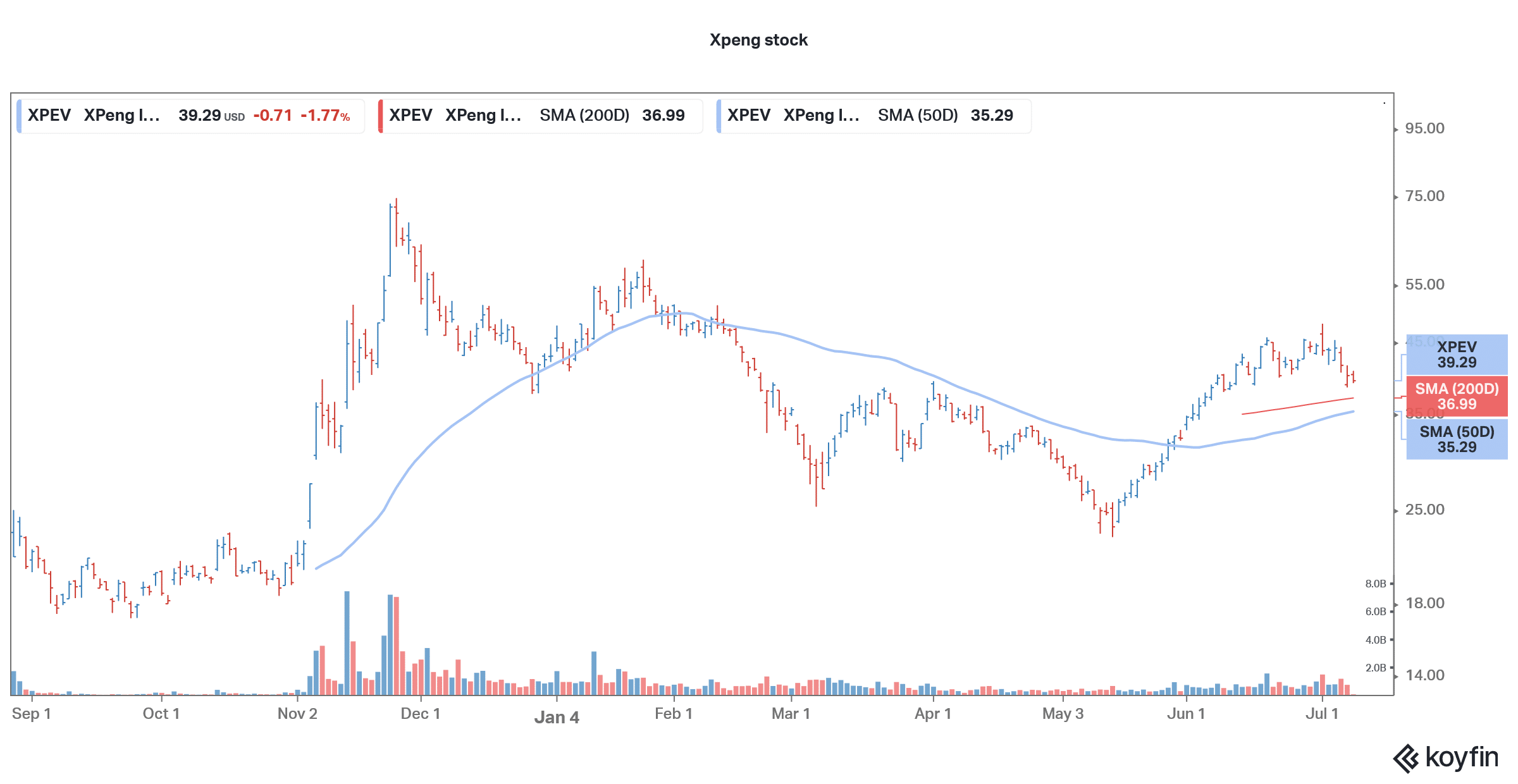
While China has targeted tech companies, it looks highly unlikely that the country will go after the electric vehicle companies as it considers it a strategic industry. The country has been investing in the domestic electric vehicle companies and last year the Hefei Municipal Corporation bailed out NIO when its survival only came under a scanner.
Earlier this year, Guangdong Yuecai Investment Holdings Co., Ltd, the investment arm of the Guangdong provincial government also invested in Xpeng. The company had a cash pile of $5.5 billion at the end of March and it has raised another $1.8 billion through the Hong Kong listing. Xpeng stock trades at an NTM (next-12 months) EV-to-sales multiple of 10.75x which not seems too high. Overall, looking at the strong growth outlook for electric vehicles, Xpeng looks like a good Chinese stock to buy now.
67% of all retail investor accounts lose money when trading CFDs with this provider.
4. BYD Company Limited (OTC: BYDDF)
While other pure-play electric vehicle companies get a lot of attention, BYD Company does not gets much attention from investors which also reflects in its tepid valuations. Unlike other Chinese electric vehicle companies, BYD is posting profits and trades at an NTM EV-to-sales multiple of around 3.4x.
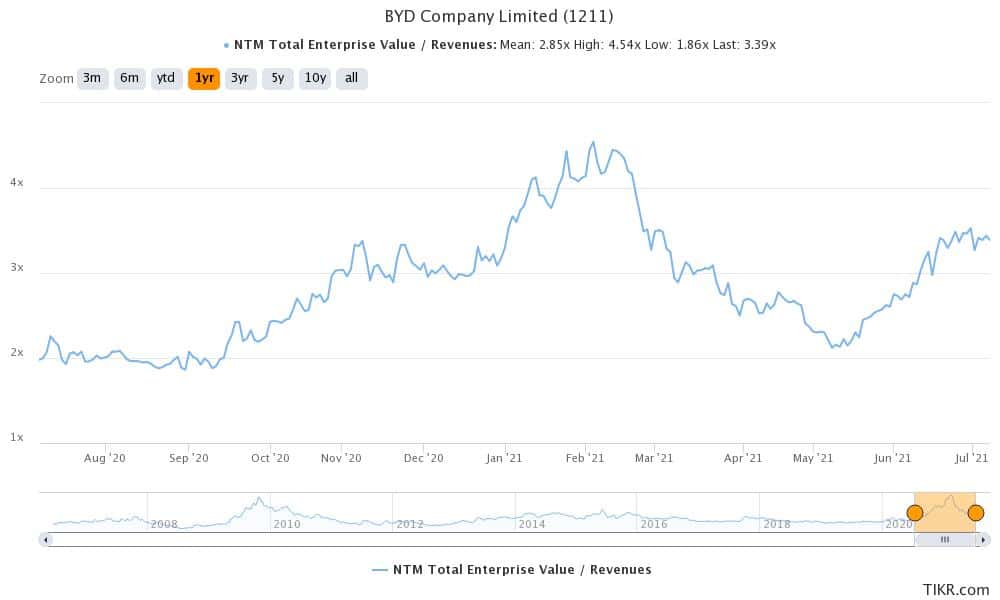
Notably, even Warren Buffett, who is known for his value investing credentials, has invested in the company. In the first quarter of 2021, BYD outsold the more popular electric car companies like NIO and Li Auto. BYD looks like an attractive Chinese stock to buy now.
BYD looks like a good Chinese stock to buy
Looking at the technicals, BYD trades above the 50-day, 100-day, and 200-day SMA which is a bullish technical indicator. The RSI is 52.1 which indicates that the stock is neither overbought nor oversold.
67% of all retail investor accounts lose money when trading CFDs with this provider.
5. JD.com (NYSE: JD)
Like Alibaba, JD stock has also been weak amid China’s tech crackdown. However, the company’s regulatory woes are not as deep, as say BABA or DIDI. Still, JD stock is down over 15% so far in 2021 and is trading at a steep discount to the 52-week high prices. However, it looks like a good Chinese stock to buy now and play the country’s tech industry.
Wall Street analysts are also bullish on JD stock and its median target price of $99.14 implies an upside of almost 36% over the next 12 months. Of the 44 analysts covering the stock, 40 rates it as a buy while three have rated it as a hold. One analyst has a sell rating on JD stock.
Meanwhile, Cathie Wood of ARK Invest is also bullish on JD stock and bought more shares of the Chinese stock in 2021. Alibaba and Tencent are the other major Chinese stocks in ARK’s portfolio.
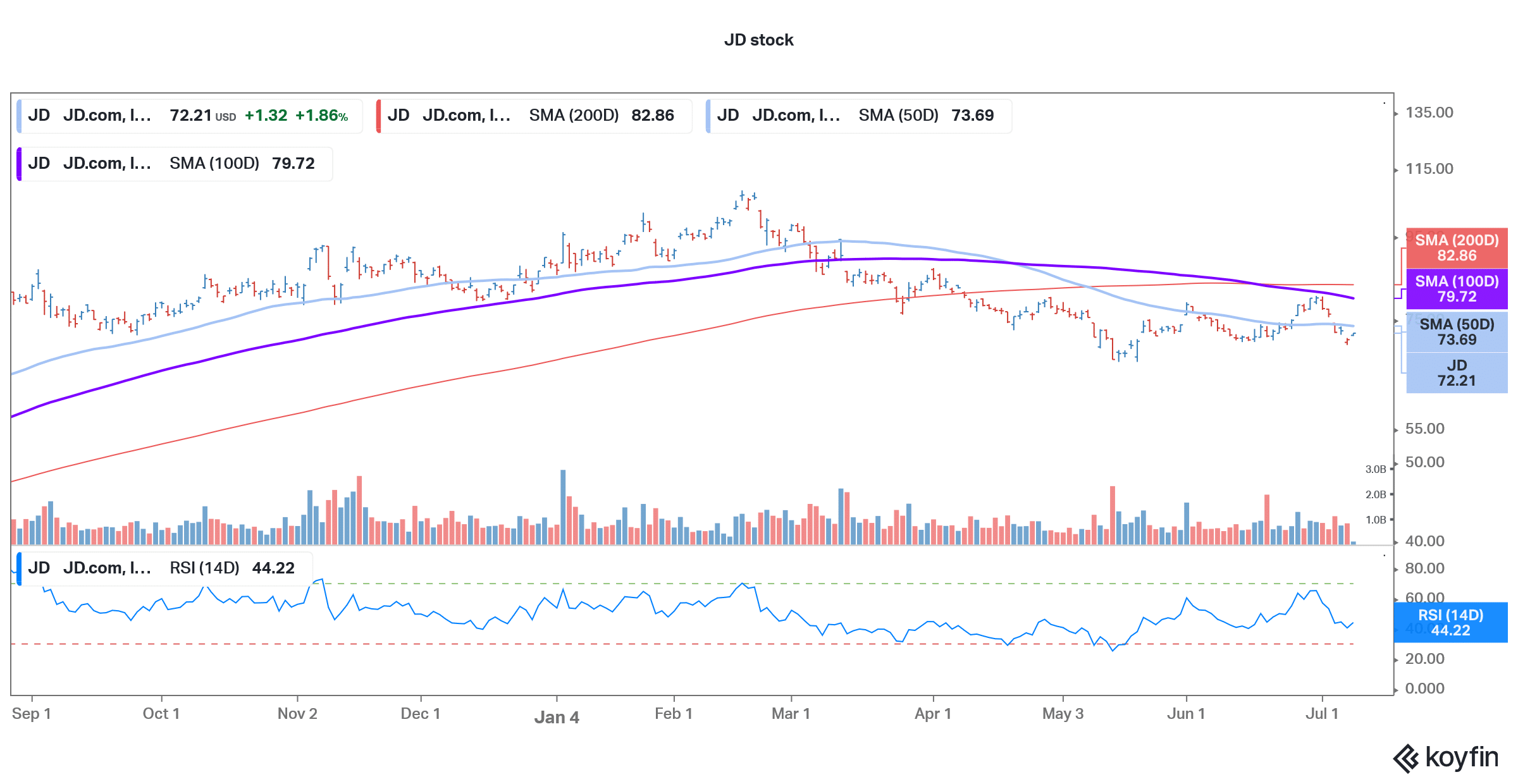
JD looks like a good Chinese stock to buy in July
JD stock faces resistance near the 100-day SMA and fell below the trendline. Now, the stock is facing resistance at the 50-day SMA which is currently at $73.69. Looking at the current momentum, the stock could rise above the 50-day SMA and move towards the 100-day SMA. The 14-day RSI of 44.2 is a neutral indicator.
The stock currently trades at an NTM PE multiple of 48.7x. The multiple is higher than the historical average but looks justified by the growth outlook. The company is also investing in autonomous driving which will add long-term shareholder value.
Overall, the worst seems over for Chinese stocks and the US-listed Chinese stocks are broadly in the green today. The momentum could continue as these stocks look to recoup more of their recent losses.
67% of all retail investor accounts lose money when trading CFDs with this provider.





